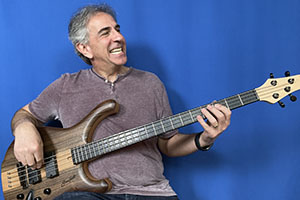It’s important to find the right balance
By Jon Liebman
Week of January 3, 2022
So you’ve decided that too much time has gone by and you’re still not satisfied with your level of bass playing. You refuse to wait any longer and you’re finally going to do something about it.
You know all too well how frustrating and uncomfortable it is finding yourself in one situation after another where you really don’t know enough about what you’re doing when it comes to playing bass. You’re not clamoring to become the next Jaco, or Victor Wooten. You just want to get together with friends, lay down some decent bass grooves, and have fun.
I’m excited for you and your quest to become a good bass player. More than half the adult population regrets never learning to play an instrument, so congratulations on beating the odds!
I was talking with one of my favorite bass players, Tom Kennedy, a couple weeks ago, in a conversation published as this week’s For Bass Players Only interview. Tom has some interesting thoughts on the best way to learn bass, especially if you’ve never played before.
Having performed with some of the biggest names in jazz (Dizzy Gillespie, Freddie Hubbard, James Moody…) when he was only a teenager, Tom learned to play bass under some pretty unusual circumstances, to say the least. It was great to hear him share his perspectives on learning bass.
Basically, he says to just go for it, even if you don’t know what you’re doing. “Let’s get there,” he says. “Let’s try to get the point out and get the music out first.”
I don’t totally disagree with Tom’s point. Given his musical upbringing, he didn’t have much of a choice when he first got started. But I’ve always taken a “teach a man to fish” approach with my students. First, you need to learn what to do, then, after you understand certain concepts, you can apply them in a way that works for you.
“I’m not putting down the structured way of playing at all,” he says. “I’m really not. I think eventually we all have to do it correctly, or what is correct for us. I notice (though) that certain things would work for certain students and not for others.”
There’s a definite balance that needs to be struck, and, no, it’s not the same for everyone. I’ve never been a proponent of “chops for chops’ sake” or learning scales and modes “just because.” Those things should all be a means to an end. The ultimate goal, of course, is the make music.
“If you get too hung up on technique in the beginning,” Tom says, “you’re kind of missing some of the organic character of what it is to play the instrument.”
Again, you need to find the right balance. If you’re a member of the Bottom Line Club, right here at For Bass Players Only, you understand this approach very well. You’re following a solid framework and learning to play some “in the pocket” bass grooves in all styles. Throughout the process, you’re consistently becoming better prepared to make up your own bass lines, lay down your own grooves, and come up with your own solos. That’s when it gets really enjoyable!
“It’s fun to maybe emulate and try to look like somebody and just kind of mess around and do that thing,” says Tom. “Be a kid. They call it ‘playing music,’ and I think you gotta play.”
Technique is important, for sure. So is just playing. In your newfound quest to up your game and finally learn to become satisfied with – and proud of! – your bass playing, be sure to keep that balance in mind.
Have a thought on the subject? Leave a comment below and let me know what you think. In the meantime, check out my interview with Tom here.





